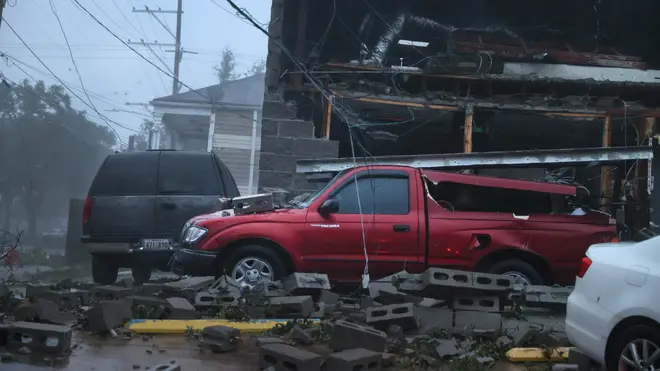
Oli Dugmore 4am - 7am
30 August 2021, 11:03 | Updated: 31 August 2021, 11:29

The first death has been confirmed as Hurricane Ida, one of the most powerful storms ever to hit the US, batters the country's coast.
The storm knocked out power to all of New Orleans, blowing roofs off buildings and reversing the flow of the Mississippi River as it rushed from the Louisiana coast.
A person was found dead following a report of a fallen tree on a home in Prairieville, the Ascension Parish Sheriff's Office said on Facebook.
READ MORE: Hurricane Ida hits Louisiana as people brace for 150mph winds and severe flooding
Prairieville is a suburb of Baton Rouge, Louisiana's capital city.
The power outage in New Orleans heightened the city's vulnerability to flooding and left hundreds of thousands of people without air conditioning and refrigeration in sweltering summer heat.
More than two million people living in and around New Orleans and Baton Rouge are under threat.
Before and after security camera footage from Fire Station #12 in Delacroix within a 1 hour time span. #idahurricane #HurricaneIda #Hurricane #Category4 pic.twitter.com/9PL8V9KySA
— St. Bernard Parish (@StBGov) August 29, 2021
Ida - a Category 4 storm - hit on the same date Hurricane Katrina ravaged Louisiana and Mississippi 16 years ago, coming ashore about 45 miles west of where Category 3 Katrina first struck land.
Ida's 150 mph winds tied it for the fifth-strongest hurricane to ever hit mainland US.
It gathered strength as it moved through some of the warmest ocean water in the world in the northern Gulf of Mexico over the weekend.
As it travelled inland it dropped to a Category 1 storm with maximum winds of 95 mph.
Wind gusts are picking up in Houma, Louisiana. Eyewall coming soon. #Hurricane #Ida pic.twitter.com/XiKrGmFPj8
— Mike Theiss (@MikeTheiss) August 29, 2021
Louisiana governor John Bel Edwards told The Associated Press: "This is going to be much stronger than we usually see and, quite frankly, if you had to draw up the worst possible path for a hurricane in Louisiana, it would be something very, very close to what we're seeing."
The entire city of New Orleans was without power late on Sunday, according to city officials.
The city's power supplier - Entergy - confirmed that the only power in the city was coming from generators, the city's Office of Homeland Security & Emergency Preparedness said on Twitter.
The city relies on Entergy for backup power for the pumps that remove storm water from city streets.
More than two million customers were without power in Louisiana, and over 40,000 were in the dark in Mississippi, according to PowerOutage.US, which tracks outages nationwide.
In New Orleans, wind tore at awnings and caused buildings to sway and water to spill out of Lake Ponchartrain.
Damage from #HurricaneIda in the French Quarter of New Orleans pic.twitter.com/RPVQzcTE1c
— Cleavon MD 💉 (@Cleavon_MD) August 29, 2021
US Army Corps of Engineers spokesman Ricky Boyette said engineers detected a "negative flow" on the Mississippi River as a result of the storm surge.
Officials said Ida's swift intensification from a few thunderstorms to a massive hurricane in just three days left no time to organise a mandatory evacuation of New Orleans' 390,000 residents.
The region getting Ida's worst includes petrochemical sites and major ports, which could sustain significant damage.
It is also an area that is already reeling from a resurgence of Covid-19 infections due to low vaccination rates and the highly contagious delta variant.
New Orleans hospitals planned to ride out the storm with their beds nearly full, as similarly stressed hospitals elsewhere had little room for evacuated patients.
Nurse captures roof being blown off at OCHSNER main campus. (credit: Courtesy: Chrissy Gottbrath) #HurricaneIda #nola pic.twitter.com/xSM95o1Yj1
— BunChoum (@BunChoum) August 30, 2021
The hurricane was also threatening neighbouring Mississippi, where Katrina demolished oceanfront homes.
Katrina was blamed for 1,800 deaths as it caused levee breaches and catastrophic flooding in New Orleans.
President Joe Biden approved emergency declarations for Louisiana and Mississippi ahead of Ida's arrival.
He said on Sunday the country was praying for the best for Louisiana and would put its "full might behind the rescue and recovery" effort once the storm passes.